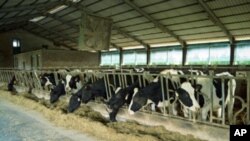Raising animals for food damages the environment as much as fossil fuel use, according to a new UN report.
A panel of 27 experts with the UN Environment Program looked through previous UN reports to assess what economic activities generate the most pollution and use the most resources.
Most of the data comes from the industrialized world. Not surprisingly, burning fossil fuels for transportation and electrical generation top the list for their contributions to climate change, acid rain and toxic pollution.
But the report singles out food production as the other major factor driving environmental degradation.
Farms pollute, consume
The report notes that raising livestock and clearing land for farms and ranches are significant greenhouse-gas emitters.
Fertilizers and pesticides are the largest contributors to water pollution. And the world's insatiable appetite is depleting the planet's fisheries and using up land and fresh water at an alarming rate.
The growing demand for meat and dairy products is putting particular strain on the environment.
"In order to raise cattle, basically you need to consume a lot of feed," says study co-author Sangwon Suh at the University of California, Santa Barbara. "And in order to produce feed, you need to use land, fertilizers and agrochemicals which, in turn, affect our environment."
A world with less meat?
The report concludes, "A substantial reduction of impacts would only be possible with a substantial worldwide diet change, away from animal products."
Gale Buchanan, a former under-secretary at the US Department of Agriculture, says that's going too far.
"My reaction to the document is: we have problems. Let's do the research to try to fix the problems rather than changing the whole diet of the human race," he says.
It's human nature to want more meat and dairy, Buchanana says, and that will be very difficult to change. He calls for a major increase in agricultural research into ways to increase food production while tackling the environmental challenges.










